Neither hippies nor nomads: Unaffordable rent in the US forces thousands into a mobile lifestyle
The Endres family’s home is two old vehicles with no fixed address. Like them, around 400,000 people lead this type of life in the United States
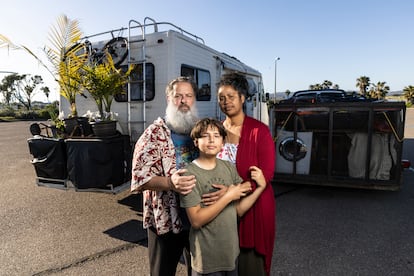
Ayden, 13, has always lived on wheels. Born in a San Diego hospital, he spent time in an incubator before his parents took him to live in a small, converted ice cream truck. Now the family lives in an old 1984 Southwind mobile home. He’s a happy and healthy child who enjoys enjoying playing on the street, watching YouTube videos, and creating his own animations. His parents shower him with love, and like many families with children, he is the center of attention.
Ayden has never attended school. His mother, Julienna, is a 53-year-old woman from New York. She teaches him in a makeshift classroom for three hours a day, five days a week. Ayden’s desk is a board on top of the steering wheel. They currently reside in San Diego, a southern California city of 1.4 million, where they have been living since Ayden’s birth. Today, they have geometry class. “Living in a mobile home with my son has forced me to be very creative. From Monday to Friday, we have a schedule where we cover seven subjects, including physical education. I teach him using the traditional English method that was used back in the 18th century. I do it this way because I just don’t agree with the modern system. He’s learning much faster by going back to how education used to be.”
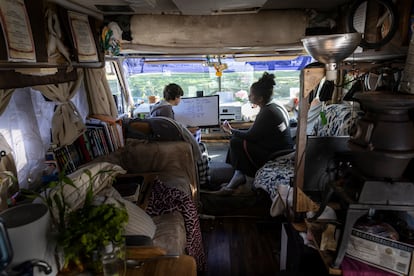
While Julienna is drawing isosceles triangles on a small whiteboard, Chris Endres, the 56-year-old father, who is from Washington state, starts making a breakfast of potatoes, cheese and bacon. He leaves the mobile home and heads to his white Chevrolet van that holds a gas generator and a refrigerator. The van tows a trailer with other belongings, including a washing machine. The aroma of fresh coffee fills the space. A large man with bushy and graying beard, Chris has been living in vehicles since he was 16. “My dad was an alcoholic and pretty violent. I was in my sophomore year of high school when he straight-up told me he didn’t want me around anymore. He wanted to be with his girlfriend instead, so he kicked me out. Ever since then, living on wheels has been my best option all these years.”
In this family’s home, every inch of space is maximized. Next to the steering wheel is a printer; and just a year ago, they installed an internet connection. Behind the front seats is their living area, featuring a cozy two-seater sofa where Ayden usually sleeps, a shelf full of books, and a desk with a computer where Chris works. They have repurposed an old iron stove to provide heat on the few days it gets chilly in San Diego. A curtain separates the kitchen from the sleeping area, offering a little privacy. Signs of old repairs indicate a potential leaky roof problem.
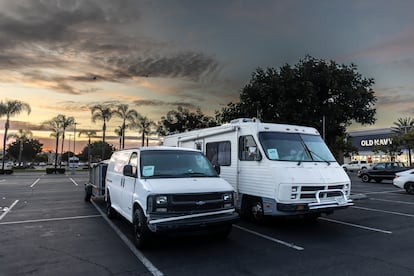
According to 2021 data from the Association of RV Industries, there are around 400,000 people living in mobile homes in the United States. A study published last year by San Diego’s Regional Task Force on Homelessness (RTFH) revealed that the city has over 8,400 unsheltered individuals, with 713 living in vehicles. Unlike other California cities like Oakland and Los Angeles, San Diego doesn’t have streets full of stripped cars, tents and recreational vehicles (RV). Known for its clean streets, low crime rate and beautiful beaches, San Diego’s growing homeless population has become concerning. San Diego Mayor Todd Gloria (Democrat) said during a visit to a school last June that he would not tolerate the degradation of the city. He promised to take action against homeless people living on the streets, particularly in sensitive areas around parks and schools frequented by children. “The streets and sidewalks of the city can’t be anyone’s home,” the mayor declared. During the same speech, he also stated that the local government is actively working to establish safe zones with public services and security for the homeless community.
Homelessness in the United States is becoming an increasingly pressing issue. According to the National Alliance to End Homelessness, the number has risen by 35% since 2015, totaling almost 600,000 people across the country. Of these, 28% are complete families. Housing First is a bipartisan policy that offers permanent housing as quickly as possible to homeless people. But the 20-year-old policy has come under fire as the 2024 elections approach. Democrats have implemented stricter policies to tackle the issue of homelessness in cities like San Francisco and Los Angeles. Meanwhile, Republicans aligned with Trump perceive these measures as exacerbating the problem. Republican Senator JD Vance from Ohio (author of the acclaimed memoir Hillbilly Elegy) says taxpayers are frustrated by programs that paradoxically lead to even more homelessness.
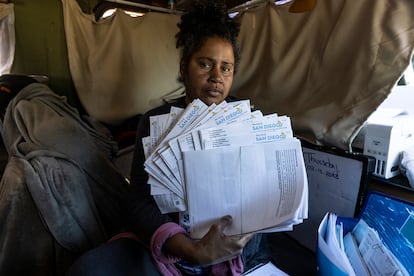
No one in the Endres family has a steady job right now, but this wasn’t always the case. Julienna previously owned a successful kitchen design company and lived in an apartment. But the 2008 financial crisis forced her to shut down the business and she has been looking for work ever since. “I’ve been trying to find a job,” she said. “Actually, I’m in the middle of a selection process right now. But companies don’t seem to want to hire someone who doesn’t have a home. It’s like everything comes to a halt when we can’t provide an address. All we have is a PO box — it’s a major obstacle for us.” Chris claims to have been one of the first Uber drivers in San Diego, but he used a rented car and was barely able to cover the cost. After that, he set up a beverage stand by the beach. Their sole source of income is a monthly subsidy of $700 and $430 in food stamps from the state. Once a week, in one of the priciest areas of the U.S., the family goes to a religious charity that serves meals for the homeless. According to the federal government’s Bureau of Economic Analysis, a family like the Endres spends around $1,000 monthly on food.
Julienna says they live in a vehicle primarily for financial reasons. “Our incomes are really low, and the cost of renting in San Diego and across the state is very high.” However, she also points out the positive aspects of living in a mobile home. “There’s more freedom — you can explore different places and not just be stuck indoors in a little box. Your home extends outdoors, wherever you happen to be.”
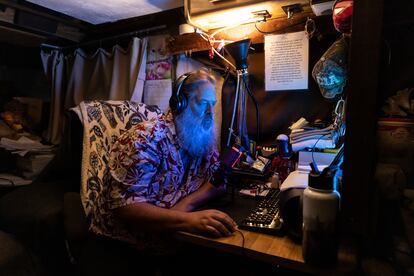
After classes, Juli, as her husband fondly calls her, sits on the bed in the back of the mobile home and reads her Bible for an hour. Occasionally, she reads a verse aloud, sharing it with the family. The close-knit clan has a deep faith, and notes about Jesus and Christianity are posted around the mobile home. “When I ended up on the streets without a family at a young age, faith in God and support from kind strangers in religious communities helped me overcome many challenges,” said Chris.
The Endres family’s vehicles are parked in a spacious outdoor lot in Mission Bay. While there are several other vehicles nearby, the closest one is a small yellow school bus converted into a home. They are just 100 feet from a picturesque beach with palm trees, clear blue water, public amenities and a playground. “We always try to stay near a park so Ayden can hang out with other kids,” said Juli as she watches her son walk towards the beach. Although there are no kids around today, Ayden’s imagination takes flight on his own. Using palm fronds provided by a thoughtful city gardener, he builds a secret hideout.
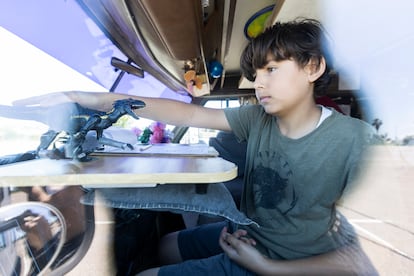
It’s getting dark, and the Endres family needs to find a place to spend the night since the San Diego City Council has banned parking this type of vehicle on the streets between two and six in the morning. “This is the nightmare we deal with every single day. The first thing I do each morning is to check the windshield for any tickets. After five tickets, they can tow your vehicle away. If you’ve got the money, you pay up and won’t get into much trouble. But if you can’t pay, like us, they have the right to impound the vehicle and take everything. It’s extortion!” But for now, they have discovered a way to fight back. “So here’s what I do: I appeal the fines in court, which is getting tough since I already have 47 appeals in process.” While an appeal is being processed, any fines are temporarily suspended.
According to lawyer Ann Menasche, who represents people living in vehicles in San Diego, the issue lies in the absence of alternatives for her clients to comply with the law. “There are two regulations in effect. The first is a housing ordinance, which is considered a criminal violation. It expressly prohibits dwelling in vehicles and non-compliance can result in arrest. The second regulation pertains to parking and violations carry fines of $112.50. Failure to pay within 21 days will result in the fine doubling. Unfortunately, there is only one parking lot available in the city, which is often at full capacity and expensive, making it unaffordable for the affected individuals. Consequently, they have no other legal alternatives.” Additionally, the city’s resources for housing are extremely limited. “The waiting list for public housing in San Diego is eight to 10 years. And most of my clients have been denied.” Menasche and other lawyers have been engaged in a legal battle for the city to provide people with an alternative to sanctions. In August 2021, a California court ruled that the lawsuit against RV restrictions has a legal basis to proceed.
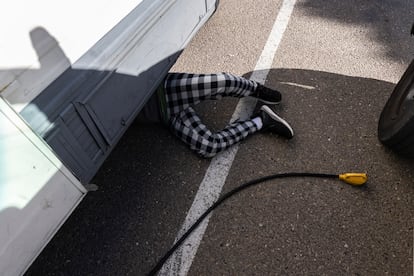
It’s almost midnight and Ayden is asleep on the couch with his toy dinosaur. Chris and Julienna are each driving a vehicle to a place they believe is safe and where the police won’t ticket them. “For the past few weeks, we’ve been spending nights in the parking lot of this shopping center, right across from a Home Depot. Since it’s private property, the police can’t ticket us. But three days ago, even though we made sure to leave before the store opened, a security guard told us we couldn’t sleep there anymore.”
Tonight, they’ve chosen Liberty Station, a commercial development near San Diego Bay. They’re waiting for their welfare check at the end of the month, which is their sole source of support. These last few days are challenging as they’re running low on gas and don’t have the money to fill up their tanks. Staying in one place means risking more parking tickets from the police, and an empty water tank for laundry and dishwashing. The Endres family is making do with the bare minimum until the first of the month.

These urban nomads have a plan to better their lives. A year ago, they installed an internet connection in their mobile home so Ayden could have access to online study resources. Julienna plans to create an online platform to share their homeschool methods with other families. She has also started studying to become a legal assistant to better support their legal battle against government harassment of their lifestyle. Chris is working on an English teaching project and is developing an online gaming portal. “It’s what I’ve always wanted to do since I was little. Some people want to be doctors or firefighters, but me? I wanted to work in the video game industry.”
After spending a few nights on the same street, Julienna finds a piece of paper, damp with dew, stuck to her windshield at six in the morning. Sadly, it’s yet another ticket ― number 48 — that she will have to contest. Fast forward two months, Julienna tells us that all her parking ticket appeals have been rejected by the court. Now, they’re stuck with a $4,000 debt that could double if not paid in the stipulated time frame. The Endres family’s nightmare is getting scarier. City officials now have the authority to tow away their camper — their home.
Sign up for our weekly newsletter to get more English-language news coverage from EL PAÍS USA Edition
Tu suscripción se está usando en otro dispositivo
¿Quieres añadir otro usuario a tu suscripción?
Si continúas leyendo en este dispositivo, no se podrá leer en el otro.
FlechaTu suscripción se está usando en otro dispositivo y solo puedes acceder a EL PAÍS desde un dispositivo a la vez.
Si quieres compartir tu cuenta, cambia tu suscripción a la modalidad Premium, así podrás añadir otro usuario. Cada uno accederá con su propia cuenta de email, lo que os permitirá personalizar vuestra experiencia en EL PAÍS.
¿Tienes una suscripción de empresa? Accede aquí para contratar más cuentas.
En el caso de no saber quién está usando tu cuenta, te recomendamos cambiar tu contraseña aquí.
Si decides continuar compartiendo tu cuenta, este mensaje se mostrará en tu dispositivo y en el de la otra persona que está usando tu cuenta de forma indefinida, afectando a tu experiencia de lectura. Puedes consultar aquí los términos y condiciones de la suscripción digital.









































